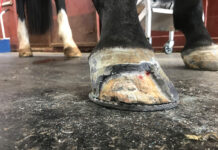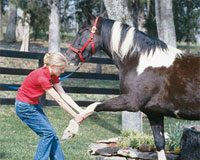
Q: What’s the correct course of action if my horse suddenly comes up lame with no apparent injury? Do I always need to call the vet, or are there cases where it’s okay to wait and see? And what should I do to keep my horse comfortable in the meantime?

A: The answer is: it depends. It depends on you (are you a 12-year-old with your first horse or are you a 70-year-old racehorse trainer that has had a string in the shedrow most of your life?) It depends on your horse (is he a young dressage horse that just started training a few months ago and has never been lame or is he a teenage trail horse that always starts out a bit stiff?) It depends on your facility (are you at a boarding stable with a well-stocked medicine cabinet and plenty of hands on deck or do you keep your horse by yourself on your own property with just a few basics?) And it depends on your veterinarian (is she 30 minutes away or 3 hours away?)
As you can see, there’s not one answer that works for all these different situations. It comes down to how knowledgeable you are, how likely this is to be a new or serious lameness, how much help and supplies there are where your horse lives, and how available your veterinarian is.
The best advice I can give you is to contact your veterinarian at the first sign of any problem in your horse, whether lameness or another issue. Let this trained professional help you decide if the situation warrants a visit right away or if it’s something that observation and medical advice over the phone may resolve. You’ll probably end up spending less time and money in the long run—and have a better outcome!–if you involve your vet right away and follow his or her specific instructions about what to do and what NOT to do.
Generally speaking, only administer medications and other treatments upon the specific recommendation of your vet, and only turnout and exercise if your vet thinks that’s wise. Above all, be sure to keep the lines of communication open with your vet regarding your horse’s improvement, decline, or if he’s unchanged.
Liked this article? Here are others you’ll enjoy:
Ask the Vet: Horse Eye Injuries
Ask the Vet: Preventing Joint Degeneration





